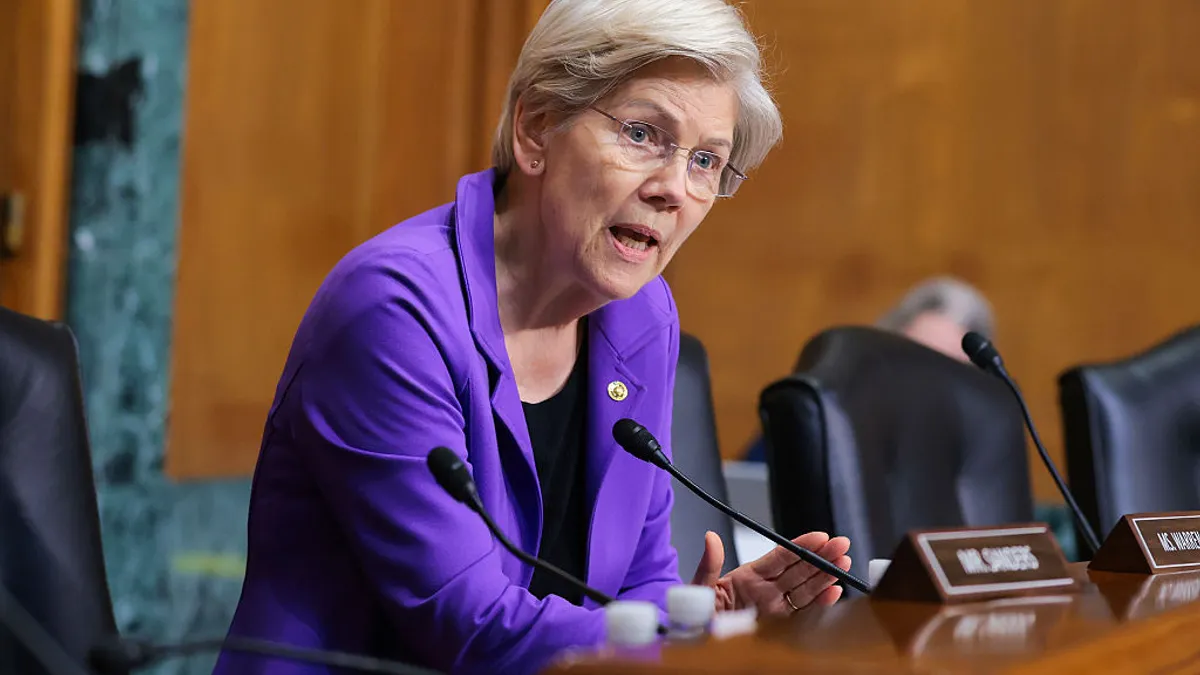Republican lawmakers didn’t mince words for Federal Deposit Insurance Corp. Chairman Martin Gruenberg during a House committee hearing Wednesday, charging him with creating the toxic culture issues at the agency and lacking the moral authority to continue leading it.
Gruenberg, along with Michael Barr, the Federal Reserve’s vice chair for supervision, and Michael Hsu, acting comptroller of the currency, appeared before the House Financial Services Committee; the semi-annual oversight hearing came just days after a scathing third-party audit report of the FDIC was released.
Since the report’s release, several lawmakers have called for Gruenberg to step down, including Sen. Tim Scott, R-SC, and House Financial Services Committee Chairman Patrick McHenry, R-NC.
Multiple Republicans on the committee asserted Wednesday that an executive found to have led a bank with such a toxic workplace culture rife with misconduct would be booted immediately, while Gruenberg seeks to hang onto his position. Rep. French Hill, R-AR, called that a “horrible double standard.”
For their part, Democrats expressed doubt over Gruenberg’s ability to lead a needed transformation of the agency, and sought to understand when and to what extent Gruenberg was aware of the FDIC’s pervasive issues.
Prior to news reports from The Wall Street Journal last November that detailed the agency’s toxic culture, Gruenberg said he was aware of cases being brought forward under the agency’s normal process, but not of deep-seated culture issues at the FDIC.
Through the independent audit, law firm Cleary Gottlieb determined the FDIC has failed to provide a workplace safe from sexual harassment, discrimination and other bad behavior “for far too many employees and for far too long.”
The 234-page report, based on testimony of more than 500 current and former FDIC employees, outlined the agency’s “misogynistic” and “insular” workplace culture, where “a widespread fear of retaliation” exists. It also revealed several instances when Gruenberg – who has led the agency for 10 of the last 13 years – lost his temper at work.
During his testimony, Gruenberg said he’s “deeply committed” to the agency and takes full responsibility for the report’s findings. He told lawmakers he’s met with some of the FDIC employees who shared their experiences with Cleary Gottlieb and is keenly aware of the impact of their experiences.
“I also acknowledge my own failures as chairman, both in failing to recognize how my temperament in meetings impacted others and for not having identified deeper cultural issues at the FDIC sooner,” he said during his testimony.
Hsu, who serves as a member of the FDIC’s board, on Wednesday agreed with lawmakers that the report is “highly disturbing” and the issue “severe,” although he believes Gruenberg has accepted responsibility and is fully committed to implementing change at the agency.
The FDIC accepts all of the Cleary Gottlieb report’s recommendations and has begun implementing some already, Gruenberg said during his testimony Wednesday. “To restore credibility with our workforce, we must act swiftly on the report’s recommendations and demonstrate a commitment to making fundamental change,” he said.
Those include appointing a transformation monitor who will oversee and report on the FDIC’s implementation of the recommendations, and tapping an independent third-party expert to assist with the agency’s efforts. The FDIC will issue requests for proposals for those “as early as this week.”
The agency also seeks to establish an independent professional conduct office that would report to the FDIC board, to better handle complaints and execute disciplinary action to address misconduct, Gruenberg said.
The FDIC has come up with its own action plan seeking to address issues initially raised in The Wall Street Journal reports last November, Gruenberg said. A number of the independent report’s recommendations are already in the FDIC’s plan, he noted, “and in some instances, our Action Plan goes beyond the recommendations in the report.”
That plan is centered on providing more support and resources to victims, strengthening the agency’s process for reporting and investigating misconduct complaints and increasing accountability for those found to have engaged in misconduct, including firing, Gruenberg said.
Gruenberg typically visits each of the FDIC’s six regional offices once a year, and such issues weren’t brought up during those meetings, he said. The FDIC’s 70 field offices, some in remote locations, present challenges when it comes to misconduct and oversight, Gruenberg said. Fundamentally, the agency has to break the “good old boys” network that’s at the core of the report, he said.
Gruenberg told the committee that four people have been let go from the agency this year related to misconduct, and the agency has made management changes.
“Sounds like you need to fire more people,” said Rep. Stephen Lynch, D-MA, adding that “a lot of people,” not just four, allowed the agency’s toxic culture to fester. “I agree with that,” Gruenberg replied.
McHenry posited that the FDIC’s workplace issues contributed to last year’s failure of Signature Bank, an FDIC-regulated lender, because agency employees were afraid to present Gruenberg with information that could cause him to lose his temper.
“You’re the wrong person for the job, to clean up this mess,” Rep. Bill Huizenga, R-MI, told Gruenberg. “Sir, you created the culture.”





















